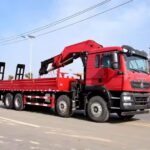In the globalized world, where the seamless movement of goods is crucial for economic stability and growth, the logistics and transport industry evolves continuously to meet rising demands. Among the significant innovations in this field is the side lifter crane. This specialized equipment plays a vital role in container handling and transport, offering flexibility, ефективність, and safety.
Understanding Side Lifter Cranes
A side lifter crane, also known as a side loader or side lifter, is a type of vehicle-mounted crane designed specifically to lift and transport shipping containers. Unlike traditional container handling equipment, which often relies on overhead cranes or large forklifts, side lifter cranes are mounted on trucks or trailers, allowing for mobile and versatile operations. These cranes use hydraulically powered lifting arms to grasp and lift containers from the side, enabling the transfer of containers between different modes of transport or ground storage.
Advantages of Side Lifter Cranes
1. Flexibility and Mobility: One of the primary advantages of side lifter cranes is their mobility. Mounted on trucks or trailers, they can travel to various locations, including ports, rail yards, and warehouses. This mobility reduces the need for fixed infrastructure, making them ideal for remote areas or temporary sites.
2. Efficiency in Loading and Unloading: Side lifters can load and unload containers quickly and efficiently. The lifting process is streamlined and can be performed by a single operator, reducing labor costs and time. This efficiency is particularly beneficial in high-volume operations where time is a critical factor.
3. Space Optimization: Traditional container handling often requires significant space for maneuvering large cranes or forklifts. Side lifter cranes, on the other hand, require less space since they operate from the side of the container. This capability allows for more efficient use of space in congested areas.
4. Безпека: Safety is a paramount concern in container handling. Side lifter cranes enhance safety by reducing the need for complex maneuvers and minimizing the risk of accidents associated with traditional lifting methods. The controlled lifting and lowering process ensures that containers are gently handled, reducing the risk of damage to the cargo.
5. Cost-Effectiveness: The combination of reduced labor costs, increased efficiency, and minimal infrastructure requirements makes side lifter cranes a cost-effective solution for container handling. Businesses can achieve significant savings by integrating these cranes into their logistics operations.

Applications of Side Lifter Cranes
The versatility of side lifter cranes allows them to be used in various industries and applications:
1. Port Operations: Ports are among the busiest hubs for container handling. Side lifter cranes facilitate the swift transfer of containers from ships to trucks or railcars, enhancing port efficiency and reducing turnaround times.
2. Rail Yards: Rail transport is a crucial component of the logistics chain. Side lifter cranes enable the efficient loading and unloading of containers onto railcars, optimizing the use of rail infrastructure and reducing bottlenecks.
3. Warehousing and Distribution: In warehousing and distribution centers, side lifters streamline the process of moving containers between storage areas and transport vehicles. This capability is particularly useful for just-in-time (JIT) inventory systems, where timely deliveries are essential.
4. Construction Sites: Construction projects often require the transport of large and heavy materials. Side lifter cranes can deliver containers directly to construction sites, ensuring that materials are available when needed without the need for additional handling equipment.
5. Remote and Temporary Locations: In remote or temporary locations, such as mining sites or disaster relief areas, the lack of infrastructure can hinder logistics operations. Side lifter cranes provide a practical solution by offering on-site container handling capabilities without the need for permanent installations.
Technological Advancements
As with many aspects of modern logistics, technological advancements are continually enhancing the capabilities of side lifter cranes:
1. Automation and Remote Control: The integration of automation and remote control systems allows operators to handle containers with precision and minimal manual intervention. These technologies enhance safety and efficiency while reducing the risk of human error.
2. Telematics and Fleet Management: Telematics systems provide real-time data on the location, status, and performance of side lifter cranes. This information enables better fleet management, maintenance scheduling, and optimization of logistics operations.
3. Environmental Considerations: The logistics industry is increasingly focused on sustainability. Side lifter cranes are being designed with fuel-efficient engines and electric power options to reduce their environmental impact. Додатково, advancements in hydraulic systems improve energy efficiency and reduce emissions.
4. Enhanced Load Capacity: Modern side lifter cranes are being engineered to handle larger and heavier containers, keeping pace with the trend towards larger shipping containers in global trade.
Challenges and Future Outlook
Despite their many advantages, side lifter cranes also face certain challenges:
1. Initial Investment: The cost of acquiring side lifter cranes can be substantial. Проте, this investment is often offset by long-term savings in labor and infrastructure costs.
2. Maintenance and Training: Regular maintenance is crucial to ensure the safe and efficient operation of side lifter cranes. Додатково, operators require specialized training to handle these cranes effectively.
Looking to the future, the role of side lifter cranes in container handling and transport is set to expand. The continued growth of global trade, coupled with advancements in technology, will drive demand for more efficient and versatile logistics solutions. Innovations such as autonomous side lifter cranes and further integration with smart logistics systems will enhance their capabilities and provide even greater benefits to the industry.

Висновок
Side lifter cranes represent a significant advancement in the field of container handling and transport. Their flexibility, ефективність, and safety make them an invaluable asset in various industries, from port operations to construction sites. As technology continues to evolve, these cranes will play an increasingly vital role in meeting the demands of a globalized economy, ensuring that goods move seamlessly across the supply chain. With their many advantages and ongoing innovations, side lifter cranes are poised to shape the future of container logistics.









